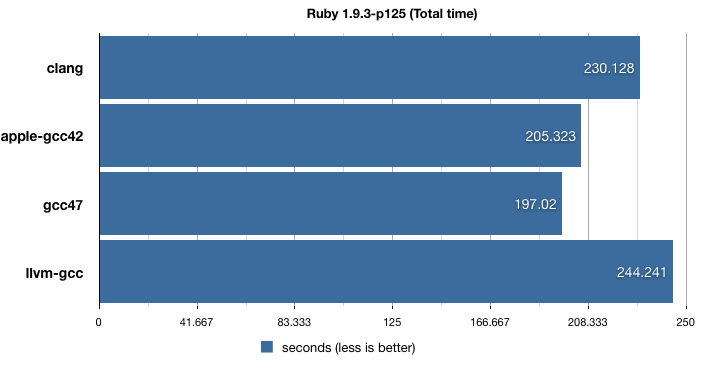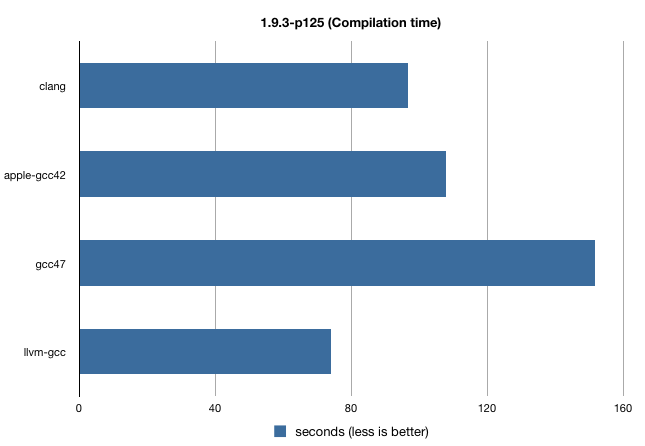RUBI 2012 implementation race
A set of benchmarks from ruby-1.9.3-p125 was used. All tests were run on:
OS: OSX Lion 10.7.3
Processor: 2.3GHz i5
Memory: 8GB 1333 MHz DDR3
SSD: OCZ Vertex 3 Max IOPS SATA III 2.5 "120GB
Implementations:
- ruby 1.8.7p249 (system ruby)
- ruby 1.9.3p125
- ruby 2.0.0dev (2012-02-25 trunk 34796)
- MacRuby 0.12 (ruby 1.9.2) (Nightly build)
- maglev 1.0.0 (ruby 1.8.7)
- rubinius 1.2.4 (1.8.7 release 2011-07-05 JI)
- rubinius 2.0.0dev (1.9.3 e22ed173 JI)
- jruby 1.7.0.dev (ruby-1.9.3-p28) (Java HotSpot (TM) 64-Bit Server VM 1.7.0_04-ea)
- jruby 1.6.7 (ruby-1.8.7-p357) (Java HotSpot (TM) 64-Bit Server VM 1.7.0_04-ea)
')
JRuby started with the flags - server -Xinvokedynamic.constants = true
From time to time I see posts about increasing ruby performance by applying patches, but what if we go even further and try to increase performance by compiling it with the latest compilers? I decided to check.
Here is a list of compilers:
- gcc version 4.2.1 (build 5658) (LLVM build 2336.9.00)
- Apple clang version 3.1 (tags / Apple / clang-318.0.45) (based on LLVM 3.1svn)
- gcc version 4.2.1 (Apple Inc. build 5666)
- gcc version 4.7.0 20120218 (experimental) (GCC)
Results:

~ 20% of the difference (the benchmark was run several times and I chose the best result) between llvm-gcc, used by default, and gcc-4.7 in synthetic tests. Not bad, I think.

Make sure nothing breaks with gcc-4.7:
This can be easily done if homebrew is installed:
... an hour later:
Note trans. About ruby-build here .
I could not stop and went about my curiosity and launched a benchmark on other popular implementations of ruby and versions of MRI. I do not cite full logs here, just highlight interesting moments.
This is a catch!
bm_vm_thread_mutex3.rb
Even if you are not going to use Thread, here are the results without this test:
ruby 1.8.7 (2010-01-10) - 572.863 seconds
ruby 1.9.3p125 (2012-02-16) - 211.655 seconds
Not passed tests for 1.8:
- bm_app_factorial.rb
- bm_so_ackermann.rb
I read that in 2.0.0-dev there is no more GIL, etc. etc., but this upcoming version is noticeably slower.
The most noticeable slowdown is still in the same test bm_vm_thread_mutext3.rb:
- rubinius 1.2.4 (1.8.7 release 2011-07-05 JI) - 3.260 seconds
- rubinius 2.0.0dev (1.9.3 e22ed173 yyyy-mm-dd JI) - 207.711 seconds
Here are the tests where the difference is most noticeable:

But the results without these tests:
1.2.4 - 518.861 seconds
2.0.0dev - 606.811 seconds
Rubinius was never fast, but was still 15% slower.
Did not pass the tests:
- factorial 4k instead of 5k
- bm_loop_generator.rb
- bm_so_ackermann.rb
- bm_vm_thread_pass_flood.rb (test timed out waiting for execution)
MacRuby is what you need if you are writing a desktop application for OS X, or simply using the OS X API, but from the point of view of performance, there is no sense to use it.
First of all, eval in MacRuby (bm_vm2_eval.rb) is rather slow:
ruby 1.9.3p125 (2012-02-16) - 29.681 seconds
MacRuby 0.12 (ruby 1.9.2) - 232.257 seconds
bm_vm2_eval.rb
So as erb parsing and creation Class instances:
bm_app_erb.rb
1.9.3p125 - 1.817 seconds
MacRuby - 81.808 second
bm_vm3_clearmethodcache.rb
1.9.3p125 - 0.748 seconds
MacRuby - 86.573 seconds
Not passed tests:
- bm_loop_generator.rb
- bm_so_count_words.rb
- bm_so_nsieve_bits.rb (timed out)
- bm_vm_thread_create_join.rb (timeout exceeded)
Interestingly, MagLev has similar problems:
bm_vm2_eval.rb - 754.028 seconds
bm_vm3_clearmethodcache.rb - 33.785 seconds

JRuby 1.7.0-dev has similar performance c 1.6.6, with a slight improvement on the bm_vm_thread_mutex3.rb test:
1.7.0-dev - 14.381 seconds
1.6.6 - 202.552 seconds
The overall result is:
1.7.0-dev - 257.584 seconds
1.6.6 - 229.502 seconds
Not passed tests:
- bm_io_select.rb
The same situation with the dev branch of MRI. Improvement only in the bm_vm_thread_create_join.rb test:
ruby 2.0.0dev (2012-02-25 trunk 34796) - 2.806 seconds
ruby 1.9.3p125 (2012-02-16) - 9.239 seconds

Summary schedule:

Schedule without:
- bm_vm_thread_mutex3.rb
- bm_vm2_eval.rb
- bm_vm3_clearmethodcache.rb

Not so bad now, is it?
Ps. From the translator : It was rather unusual to translate an article by a Russian-speaking author.
OS: OSX Lion 10.7.3
Processor: 2.3GHz i5
Memory: 8GB 1333 MHz DDR3
SSD: OCZ Vertex 3 Max IOPS SATA III 2.5 "120GB
Implementations:
- ruby 1.8.7p249 (system ruby)
- ruby 1.9.3p125
- ruby 2.0.0dev (2012-02-25 trunk 34796)
- MacRuby 0.12 (ruby 1.9.2) (Nightly build)
- maglev 1.0.0 (ruby 1.8.7)
- rubinius 1.2.4 (1.8.7 release 2011-07-05 JI)
- rubinius 2.0.0dev (1.9.3 e22ed173 JI)
- jruby 1.7.0.dev (ruby-1.9.3-p28) (Java HotSpot (TM) 64-Bit Server VM 1.7.0_04-ea)
- jruby 1.6.7 (ruby-1.8.7-p357) (Java HotSpot (TM) 64-Bit Server VM 1.7.0_04-ea)
')
JRuby started with the flags - server -Xinvokedynamic.constants = true
Compiler matter
From time to time I see posts about increasing ruby performance by applying patches, but what if we go even further and try to increase performance by compiling it with the latest compilers? I decided to check.
Here is a list of compilers:
- gcc version 4.2.1 (build 5658) (LLVM build 2336.9.00)
- Apple clang version 3.1 (tags / Apple / clang-318.0.45) (based on LLVM 3.1svn)
- gcc version 4.2.1 (Apple Inc. build 5666)
- gcc version 4.7.0 20120218 (experimental) (GCC)
#!/bin/bash compilers=( gcc gcc-4.2 gcc-4.7 clang ) for i in "${compilers[@]}"; do CC=$i ./configure --disable-install-doc --prefix ~/Projects/benches/mri/1.9.3-p125-$i time make -j4 make install done $ ruby driver.rb -v -o ~/Projects/benches/compilers-bench.txt \ --executables='~/Projects/benches/mri/1.9.3-p125-gcc/bin/ruby; ~/Projects/benches/mri/1.9.3-p125-gcc-4.2/bin/ruby; ~/Projects/benches/mri/1.9.3-p125-gcc-4.7/bin/ruby; ~/Projects/benches/mri/1.9.3-p125-clang/bin/ruby' Results:

~ 20% of the difference (the benchmark was run several times and I chose the best result) between llvm-gcc, used by default, and gcc-4.7 in synthetic tests. Not bad, I think.

Make sure nothing breaks with gcc-4.7:
PASS all 943 tests KNOWNBUGS.rb . PASS all 1 tests I want to make sure yourself
This can be easily done if homebrew is installed:
$ brew install https://raw.github.com/etehtsea/formulary/009735e66ccabc5867331f64a406073d1623c683/Formula/gcc.rb --enable-cxx --enable-profiled-build --use-gcc ... an hour later:
$ CC=gcc-4.7 ruby-build 1.9.3-p125 ~/.rbenv/versions/1.9.3-p125 Note trans. About ruby-build here .
And what about% any other implementation of ruby%?
I could not stop and went about my curiosity and launched a benchmark on other popular implementations of ruby and versions of MRI. I do not cite full logs here, just highlight interesting moments.
Do not use the default ruby
This is a catch!
bm_vm_thread_mutex3.rb
# 1000 , 1 require 'thread' m = Mutex.new r = 0 max = 2000 (1..max).map{ Thread.new{ i=0 while i<max i+=1 m.synchronize{ r += 1 } end } }.each{|e| e.join } raise r.to_s if r != max * max $ time ~/.rbenv/versions/1.8.7-p357/bin/ruby bm_vm_thread_mutex3.rb real 0m3.093s user 0m3.078s sys 0m0.013s $ /usr/bin/ruby -v ruby 1.8.7 (2011-12-28 patchlevel 357) [i686-darwin11.3.0] $ time /usr/bin/ruby bm_vm_thread_mutex3.rb ^Cbm_vm_thread_mutex3.rb:18:in `join': Interrupt from bm_vm_thread_mutex3.rb:18 from bm_vm_thread_mutex3.rb:7:in `each' from bm_vm_thread_mutex3.rb:7 real 3m54.930s user 3m54.122s sys 0m0.918s Even if you are not going to use Thread, here are the results without this test:
ruby 1.8.7 (2010-01-10) - 572.863 seconds
ruby 1.9.3p125 (2012-02-16) - 211.655 seconds
Not passed tests for 1.8:
- bm_app_factorial.rb
- bm_so_ackermann.rb
Rubinius 1.2.4 vs. 2.0.0-dev
I read that in 2.0.0-dev there is no more GIL, etc. etc., but this upcoming version is noticeably slower.
The most noticeable slowdown is still in the same test bm_vm_thread_mutext3.rb:
- rubinius 1.2.4 (1.8.7 release 2011-07-05 JI) - 3.260 seconds
- rubinius 2.0.0dev (1.9.3 e22ed173 yyyy-mm-dd JI) - 207.711 seconds
Here are the tests where the difference is most noticeable:

But the results without these tests:
1.2.4 - 518.861 seconds
2.0.0dev - 606.811 seconds
Rubinius was never fast, but was still 15% slower.
Did not pass the tests:
- factorial 4k instead of 5k
- bm_loop_generator.rb
- bm_so_ackermann.rb
- bm_vm_thread_pass_flood.rb (test timed out waiting for execution)
MacRuby 0.12 (Nightly)
MacRuby is what you need if you are writing a desktop application for OS X, or simply using the OS X API, but from the point of view of performance, there is no sense to use it.
First of all, eval in MacRuby (bm_vm2_eval.rb) is rather slow:
ruby 1.9.3p125 (2012-02-16) - 29.681 seconds
MacRuby 0.12 (ruby 1.9.2) - 232.257 seconds
bm_vm2_eval.rb
i=0 while i<6_000_000 i+=1 eval("1") end So as erb parsing and creation Class instances:
bm_app_erb.rb
# # Create many HTML strings with ERB. # require 'erb' data = DATA.read max = 15_000 title = "hello world!" content = "hello world!\n" * 10 max.times{ ERB.new(data).result(binding) } __END__ <html> <head> <%= title %> </head> <body> <h1> <%= title %> </h1> <p> <%= content %> </p> </body> </html> 1.9.3p125 - 1.817 seconds
MacRuby - 81.808 second
bm_vm3_clearmethodcache.rb
i=0 while i<200_000 i+=1 Class.new{ def m; end } end 1.9.3p125 - 0.748 seconds
MacRuby - 86.573 seconds
Not passed tests:
- bm_loop_generator.rb
- bm_so_count_words.rb
- bm_so_nsieve_bits.rb (timed out)
- bm_vm_thread_create_join.rb (timeout exceeded)
Maglev 1.0
Interestingly, MagLev has similar problems:
bm_vm2_eval.rb - 754.028 seconds
bm_vm3_clearmethodcache.rb - 33.785 seconds

JRuby 1.6 vs. 1.7.0-dev
JRuby 1.7.0-dev has similar performance c 1.6.6, with a slight improvement on the bm_vm_thread_mutex3.rb test:
1.7.0-dev - 14.381 seconds
1.6.6 - 202.552 seconds
The overall result is:
1.7.0-dev - 257.584 seconds
1.6.6 - 229.502 seconds
Not passed tests:
- bm_io_select.rb
MRI 2.0.0-dev vs 1.9.3-p125
The same situation with the dev branch of MRI. Improvement only in the bm_vm_thread_create_join.rb test:
ruby 2.0.0dev (2012-02-25 trunk 34796) - 2.806 seconds
ruby 1.9.3p125 (2012-02-16) - 9.239 seconds
Overall credit

Summary schedule:

Schedule without:
- bm_vm_thread_mutex3.rb
- bm_vm2_eval.rb
- bm_vm3_clearmethodcache.rb

Not so bad now, is it?
Ps. From the translator : It was rather unusual to translate an article by a Russian-speaking author.
Source: https://habr.com/ru/post/139370/
All Articles